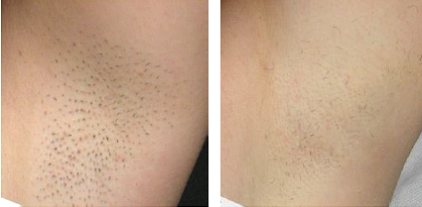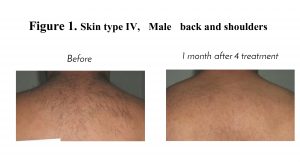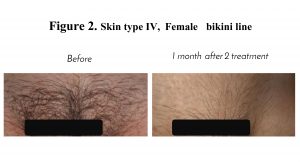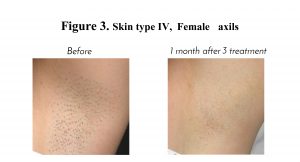CONTACT US

Treatment of Photoepilation with SharpLight DPC Technology

B. Czajkowsky, MD1, V. Kipnis, MD2
1SharpLight Medical Advisor,2AML Clinics, Israel
ABSTRACT
This paper describes the Sharplight photoepilation system with Dynamic Pulse Control (DPC) technology. The availability of the DPC in IPL Hair Removal enables a higher safety margin for effectively treating dark skin patients. Forty (40) patients of skin types II to V participated in 4 treatment sessions, performed every 3 month. Effective hair removal was observed in all cases with both, patient and practitioners, expressing high satisfaction with the procedure and its results. No adverse effects were observed apart from temporary erythema, in a few cases, which resolved without complications.
INTRODUCTION
Over the past decade, the trend in cultural and social perception of the a"aesthetically ideal" amount of body hair has been toward less and less body hair, for both males and females.
The most common technique currently used in hair removal procedures is photoepilation: the use of lasers or filtered intense pulsed light (IPL) to cause hair-follicle coagulation. This technique is based on the theory of Selective Photothermolysis. It requires a series of treatment sessions spaced 1-3 months apart and is associated with minimal discomfort and side effects.
The photoepilation application is an IPL system which features Dynamic Pulse Control (DPC) technology and thermoelectric Skin Contact Cooling to enhance safety, comfort and efficacy on skin types I to V.
DYNAMIC PULSE CONTROL
Dynamic Pulse Control was developed to enable an additional dimension in controlling safety and efficacy of photoepilation on all skin and hair types.
In addition to pulse duration control which is available on most lasers and IPL photoepilation Platforms, DPC enables pulse configuration control. For each fluence and pulse duration setting, light energy may be released in one of three DPC settings: Smooth Pulse, Long Pulse and High Pulse which is the most aggressive. Light skin patients and light/thin hair can tolerate more aggressive energy delivery while darker skin and dark/thick hair can be effectively removed with minimally energy delivery which is essential to assure safety.
Dynamic Pulse Control is enabled through the use of state-of-the-art pulse forming network (PFN) electronics designed specifically for the SharpLight systems. Setting of the DPC is based on patient skin type, hair color and hair thickness according to the following:
Smooth pulse: Delivers a "square" homogeneous pulse with low peak power, hence slow heating effect. Is indicated for skin types I to V and thick, dark hair.
Long pulse: Delivers a train of pulses at 50% duty cycle (on-time equal's off-time). It is indicated for skin type's I-IV and medium brown hair.
High pulse: Delivers a train of pulses with high peak power. It is indicated for skin type's I-III and fine light hair.
No additional external skin cooling technique was required. A test was first conducted to determine the optimal treatment parameters for each patient.
Side effects of treatment, such as pain or excessive erythema or edema, as well as any adverse effects such as burns, hypopigmentation or hyper-pigmentation, were recorded.
Subjective overall patients' satisfaction with the procedure was recorded.
RESULTS
Use of the platform with DPC yielded the following results:
36 patients (75 %) exhibited very good immediate skin reaction with the recommended parameters; 2 patients (12.5%) exhibited only slight skin reaction and 2 patients (12.5%) exhibited over reaction with the recommended test parameters.
Only two cases of mild adverse events were recorded: erythema which lasted for a few
hours then spontaneously resolved without any further complications.
All the patients were able to bear the treatment without excessive sensation of pain. No significant discomfort was recorded. Practitioner's satisfaction grades are summarized in table 1 and patients' satisfaction grades are summarized in table 2.
Table 1. Practitioner's Satisfaction Grade
| Response Category | Males | Females |
| Very satisfied | 18 | 18 |
| Satisfied | 2 | |
| Not satisfied | 2 |
Table 2. Patient's Satisfaction Grade
| Response Category | % of Treated Patients |
| Very satisfied | 75 |
| Satisfied | 12.5 |
| Not satisfied | 12.5 |
CONCLUSIONS
This clinical study has demonstrated high safety and efficacy of the platforms in treating skin type III-V patients for photoepilation. The study resulted in very high patient satisfaction with 75% of the patients reporting high satisfaction.
No significant side effects and no complications were observed during the study.
The high level of safety and comfort observed by the practitioner and reported by the patients is attributed to both the DPC pulse control and TEC contact skin cooling. The availability of an additional 730nm hand piece potentially extends the applicability to darker skin types.
The practitioners performing this study have many years of experience performing photoepilation with both lasers and other IPL systems. They found that the addition of the DPC as well as the contact cooling allows use of higher fluences, reduces the required number of treatment sessions, negates the need for anesthesia and minimizes side effects and complications.
Some of the patients had previously experienced treatments with other photoepilation Platforms and expressed clear preference for the Sharplight's treatment due to reduced sensation of pain and overall improved treatment comfort.
SUMMARY
Photoepilation has become the treatment of choice for male and female patients, on any body area where hair removal is desired for aesthetic purposes.
SLT platforms with DPC technology and Contact Cooling 4 hand pieces is a step forward in the research of maximum effectiveness and safety in the hair removal field.
The treatments assessments for the proposed protocol have yielded excellent results: 87.5 % positive reactions.
Erythema and per follicular edema were evident in a high percentage of the cases (75 %), which indicates hair follicle coagulation and subsequent hair reduction.
Adverse secondary effects were minimum (12.5 %) and transient, and there were no pain complaints. 87.5 % of the patients were very satisfied with the treatment, with the practitioners' work during the treatment sessions, and with the final, faster results.
The practitioners were highly satisfied with the treatments and the patients' responses to it, as it offers an easy method of operation and allows for uninterrupted treatment application within each session.
REFERENCES
Altshuler GB, Anderson RR,Smirnove MZ, et al (2001) Extended theory of selective photothermolysis. Laser Surg Med29:416-432.
Amin SP, Goldberg DJ., Clinical comparison of four hair removal lasers and light sources. J Cosmet Laser Ther. 2006 Jun; 8(2):65-8.
Bukhari IA., Photo-depilation: guidelines for care from the European Society for Laser Dermatology (ESLD). J Cosmet Laser Ther. 2006 Jun; 8(2):107.
El Bedewi AF., Hair removal with intense pulsed light. Lasers Med Sci. 2004; 19(1):48-51.
Fodor L, Menachem M, Ramon Y, Shoshani O, Rissin Y, Eldor L, Egozi D, Peled IJ, Ullmann Y., Hair removal using intense pulsed light (EpiLight): patient satisfaction, our experience, and literature review. Ann Plast Surg. 2005 Jan; 54(1):8-14. Review.
Gold MH, Bell MH, Foster TD, et al (1997) Long term epilation using Epilight broad band, intense pulsed light hair removal system.Dermatol Surg 23:909-913.
Hee Lee J, Huh CH, Yoon HJ, Cho KH, Chung JH., Photo-depilation results of axillaries hair in darkskinned patients by intense pulsed light: comparison between different wavelengths and pulse width. Dermatol Surg. 2006 Feb; 32(2):234-40.
Haedersdal M, Wulf HC.,Evidence-based review of hair removal using lasers and light sources. J Eur Acad Dermatol Venereol. 2006 Jan; 20(1):9-20. Review.
Lepselter J, Elman M., Biological and clinical aspects in laser hair removal. J Dermatolog Treat. 2004 Apr; 15(2):72-83. Review.
Marayiannis KB, Vlachos SP, Savva MP, Kontoes PP., Efficacy of long- and short pulse alexandrite lasers compared with an intense pulsed light source for epilation: a study on 532 sites in 389 patients. J Cosmet Laser Ther. 2003 Dec; 5(3-4):140-5.
Moreno-Arias G, Castelo-Branco C, Ferrando J., Paradoxical effect after IPL photoepilation. Dermatol Surg. 2002 Nov; 28(11):1013-6; discussion 1016.
Moreno-Arias GA, Castelo-Branco C, Ferrando J., Side-effects after IPL photoepilation. Dermatol Surg. 2002 Dec; 28(12):1131-4.
Ortolon, Ken (April 2006). Clip, Don't Nick: Physicians Target Hair Removal to Cut Surgical Infections. Texas Medicine. Retrieved on 2007-05-14.
Raulin C, Greve B, Grema H., IPL technology: a review. Lasers Surg Med. 2003; 32(2):78-87. Review.
Schroeter CA, Groenewegen JS, Reineke T, Neumann HA., Ninety percent permanent hair reduction in transsexual patients. Ann Plast Surg. 2003 Sep; 51(3):243-8.
Sadick NS, Weiss RA, Shea CR, Nagel H, Nicholson J, Prieto VG., Long-term photoepilation using a broad-spectrum intense pulsed light source. Arch Dermatol. 2000 Nov;136(11):1336-40.
Sadick NS, Shea CR, Burchette JL Jr, Prieto VG., High-intensity flashlamp photoepilation: a clinical,histological, and mechanistic study in human skin. Arch Dermatol. 1999 Jun; 135(6):668-76.
Shapiro J, Lui H., Treatments for unwanted facial hair. Skin Therapy Lett. 2005 Dec-2006 Jan; 10(10):1-4. Review
Toosi P, Sadighha A, Sharifian A, Razavi GM, A comparison study of the efficacy and side effects of different light sources in hair removal. Lasers Med Sci. 2006 Apr; 21(1):1-4.
Warner J, Weiner M, Gutowski KA., Laser hair removal. Clin Obstet Gynecol. 2006 Jun; 49(2):389- 400.
MRK-00022 Rev 2








